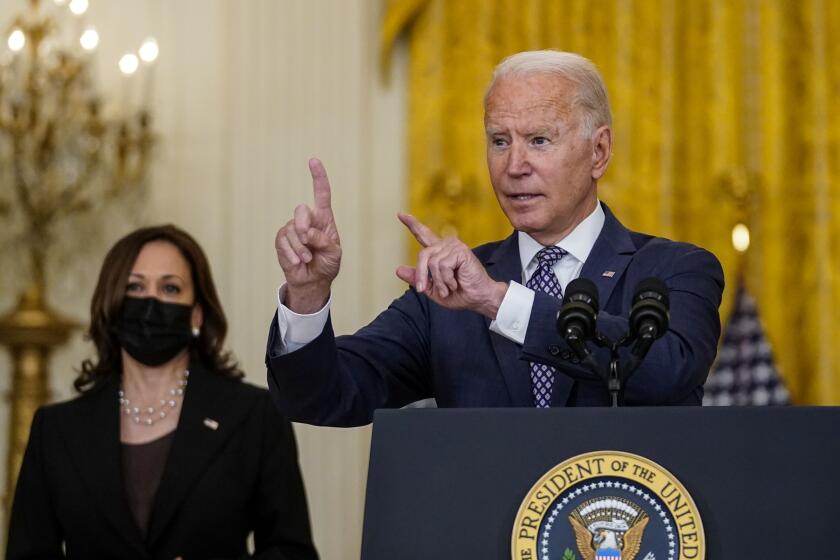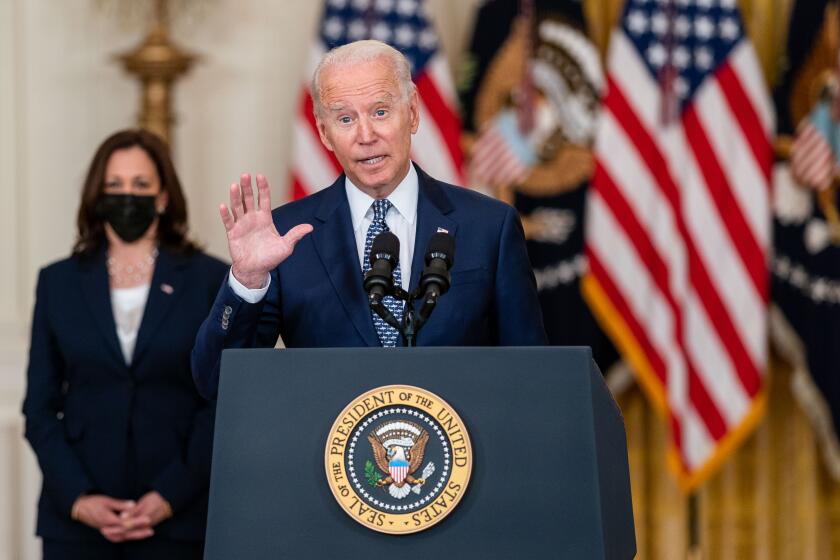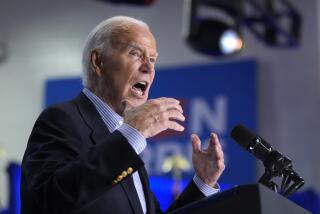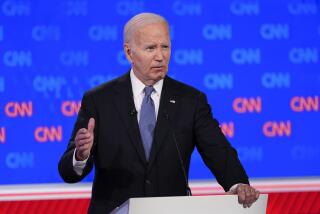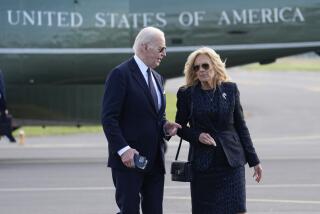Biden focuses on domestic agenda, even as hot spots flare up elsewhere
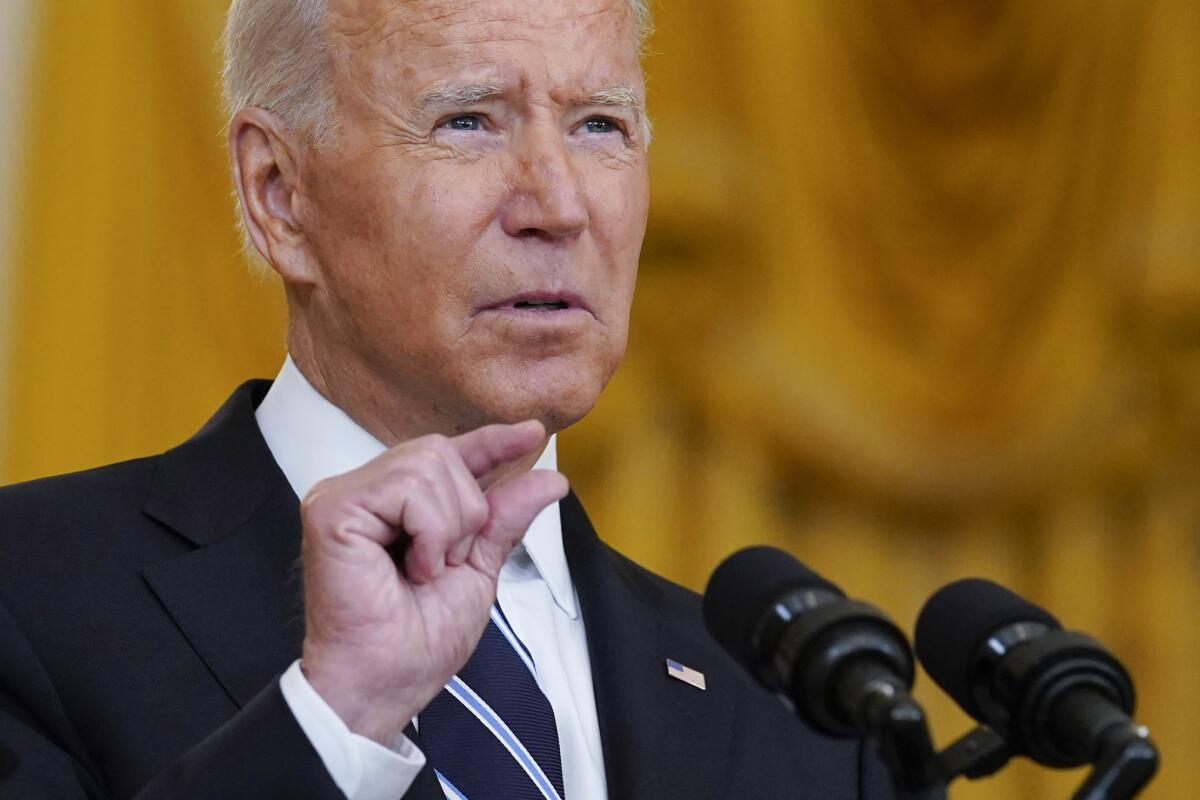
- Share via
WASHINGTON — Every morning this week at 8:45, a newly established “war room” has convened at the White House, with about 20 staffers logging onto a Zoom call to coordinate messaging and deployment of critical resources.
The operation has nothing to do with the crisis in Afghanistan — it’s about keeping President Biden’s big infrastructure push on track. Even amid the fall of Kabul to the Taliban and the frantic, last-minute military operation to rescue thousands of Americans and vulnerable Afghans, the White House has maintained its overarching focus on the domestic matters it has prioritized for the last eight months.
“The No. 1 priority for our cabinet overall, from our perspective here, is to build support throughout the [August] recess process for the legislative agenda,” said Neera Tanden, a senior advisor to the president who has overseen the war room since July. Tasked with building support for a $1.2-trillion bipartisan infrastructure measure and the Democrats’ $3.5-trillion budget proposal, Tanden is dispatching cabinet members to key states, monitoring lawmakers’ town halls and arranging hundreds of local TV interviews with administration officials.
Keeping up that effort in a week that saw Biden thrown into crisis mode amid the messy U.S. withdrawal from Afghanistan is the sort of intense multitasking that the presidency demands. But it also reflects an administration’s determination — unusual in the modern era — to plow past the news of the day without diverting its focus from a singular agenda.
The administration’s discipline has helped it maintain public support and kept things on track thus far. But its approach has risks, particularly if Biden alienates political allies by appearing to deemphasize issues that are important to them. And this week, more than any other since he took office, has shown that challenges Biden has downplayed or delegated to others can flare up, making the president’s consistency of focus in one area look more like tunnel vision.
Former White House officials say that appears to be what happened in Afghanistan, where a Taliban onslaught took the administration by surprise.
“The nature of what confronts a president today is a series of very challenging crises that obviously threaten the country in one way or another,” said Leon Panetta, who led the Defense Department and the CIA under President Obama and served as President Clinton’s chief of staff. National security, he said, is “not one of those issues that, frankly, you can put on the back burner.”
“They obviously underestimated the situation in Afghanistan, and I don’t know all the reasons for that, but clearly they misjudged the ability of the Afghan military to protect Afghanistan,” Panetta added.
After a reporter tweeted Aug. 13 that although Biden’s legislative agenda was on track, other storms, including Afghanistan, seemed to be forming, the president’s chief of staff, Ron Klain, was quick to reply with a spate of positive recent indicators that underlined the administration’s primary areas of focus.
“Record jobs report. Core CPI down from June, to 0.3%. Unemployment filings at a post-pandemic new low. Bipartisan [infrastructure] bill passed the Senate with 69 votes. Budget framework passed the Senate intact. Biggest 24 hours for vaccinations in six weeks,” Klain wrote.
He did not, however, mention Afghanistan, where less than 48 hours later, the government collapsed.
By Monday, Biden’s approval rating had fallen seven points to 46%, the lowest level of his presidency, according to a Reuters/Ipsos weekly tracking poll. Inside the White House, aides believe it will amount to a blip but recognize that any sustained dip in popularity could complicate the president’s legislative push.
President Biden vows to ‘provide safe evacuation for our Afghan allies, partners and Afghans who might be targeted’ by the Taliban.
Intent on getting a handle on the chaos abroad, Biden ordered the first deployment of forces back to Afghanistan to secure the Kabul airport on Aug. 12, according to an administration official. Since then, the official said, he has convened four meetings of the National Security Council and had dozens of phone conversations with top advisors — a frantic week of crisis management that, critics counter, might have been avoided had the administration been more diligent in tracking events and acted weeks earlier.
“Why didn’t we do this two months ago, when we had the capability to do it?” asked Matt Zeller, an Afghanistan war veteran and chair of the Assn. of Wartime Allies. He said his months of pleas to the administration to begin evacuating refugees received no response. “I was used to this with the Trump administration,” he said. “I’m appalled that people who espouse themselves to be defenders of human rights aren’t speaking to us.”
Biden bookended the week Monday and Friday with speeches on Afghanistan but spent the days in between talking about other things: announcing new efforts to combat the resurgent pandemic Wednesday and meeting privately Thursday with key congressional Democrats about the complicated legislative process required to pass his two infrastructure initiatives.
“Him spending time on infrastructure and ‘human infrastructure’ where you need to build public support just makes sense,” said Jennifer Palmieri, who was a White House communications director in the Obama administration.
The botched Afghanistan withdrawal, she continued, isn’t something Biden can ignore, even as he focuses elsewhere.
“You need to continue to do a good job evacuating people and explain what happened, but I would do the minimum required to adequately address that,” she said. “People can both support his policy [of withdrawing troops] and disapprove of the way he’s handled that. But the damage from that is done.”
The White House has been pressing ahead with its messaging campaign on infrastructure, one of the most robust and coordinated lobbying campaigns in the last decade. And the administration, populated by veterans of the Obama era, has avoided any upswell of partisan opposition like the one in August 2009, when opposition to the president’s healthcare reform push, fueled by the tea party, simmered over at contentious town halls around the country.
President Biden celebrated the Senate’s bipartisan approval of a $1-trillion infrastructure bill. But his two-track strategy has a long way to go.
In the first two weeks of this month, 14 cabinet secretaries fanned out for events with lawmakers in 26 cities. And the war room has set up more than 1,000 interviews of administration officials by local outlets in markets across the country.
“Every White House has to be built to deal with multiple issues, and this White House is no different. Our plans around August have been ongoing, and we’re executing against that plan,” Tanden said. “We have a historic moment to take on these challenges ... and even over the last several weeks, where a variety of things are happening, people have been really focused on driving that agenda forward.”
The clear prioritization of a bipartisan infrastructure bill and a Democratic budget bill, however, has frustrated elements of the party’s base whose issues have taken a back seat.
Bishop William Barber II, co-chair of the Poor People’s Campaign: A National Call for Moral Revival, who delivered the homily at Biden’s inaugural prayer service, said he and other voting-rights advocates have been urging the president to focus more attention on Republican efforts in state legislatures to make voting more difficult.
“There’s no way in the world we can settle for passing infrastructure of our roads, bridges and ports and then leave unfixed and undone the infrastructure of our democracy and voting lives and the infrastructure of our daily lives, which is living wages and healthcare,” said Barber.
Biden, determined not to get bogged down on issues without clear policy solutions, tasked Vice President Kamala Harris with overseeing the administration’s approach to voting rights and efforts to curb the immigration crisis at the southern border.
But legislation on voting rights appears unlikely. And Harris’ diplomatic effort to attack the “root causes” of migration from Central America has done little to stem the tide of asylum seekers and ease pressure on an overwhelmed immigration system. The backlog of asylum cases in immigration courts is at 1.3 million, an all-time high. In July, more than 200,000 people were apprehended at the border, the highest monthly number in more than two decades.
Jorge Loweree, policy director at the American Immigration Council, which advocates for more liberal policies, said the administration has worked to overturn some of President Trump’s harshest policies but worries that the border politics have made some officials more timid.
“We’re entering a period where the administration’s stated commitment to achieving progress on immigration issues will be tested to the greatest extent since they came into office,” he said.
Advocates note that inaction on voting rights or immigration could affect Democratic turnout in the 2022 midterm elections, already an uphill climb for the president’s party. But White House officials believe it is much better to focus on Biden’s economic agenda. If enacted, they say, the legislation will give Democrats a popular, mainstream achievement on which to run.
More to Read
Get the L.A. Times Politics newsletter
Deeply reported insights into legislation, politics and policy from Sacramento, Washington and beyond. In your inbox twice per week.
You may occasionally receive promotional content from the Los Angeles Times.
